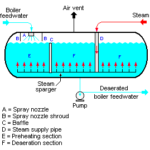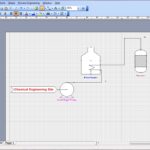Deaerators are normally used in any Chemical Process Industry or in Power Plants where boiler is employed for steam production from boiler feed water. Deaerator solves the purpose of removal of unwanted dissolved gases and dissolved oxygen from the boiler feed water before entering into boilers. Most of the deaerators are designed in such a way that the dissolved oxygen content … [Read more...]
Understanding Centrifugal Pump Curve
For an Operations Engineer who is working in a Chemical Process Industry or a Process engineer who is involved in Hydraulic calculations understanding the Centrifugal Pump Curve is an important aspect. Let us discuss in detail here. Components of Centrifugal Pump Curve Head Vs Flow Curve : H-Q Curve Efficiency Vs Flow Curve: Efficiency Curve Brake Horse Power Vs … [Read more...]
MS- VISIO for Chemical Engineers
Microsoft software VISIO is very useful tool for Chemical Engineers to prepare PFD, P& ID and other diagrams in a simple way by just dragging and dropping the symbols. We shall see how MS VISIO helps a Chemical Engineer in this article. PFD and P& ID Preparation in Visio Process Flow Diagram (PFD) and Piping and Instrumentation diagram (P& ID) can be … [Read more...]
Safety Videos – Chemical Safety Board USCSB
Safety Videos are published by the US Chemical Safety Board which is the Independent federal agency appointed by the US President to investigate the Industrial Chemical Accidents. CSB became operational from the year 1998. Chemical Safety Board reaches the accident spot to identify the root cause of the incident. CSB team conducts interviews among the witnesses of the … [Read more...]
Beacon for Newbie Process Engineer in Chemical Industry
Chemical engineer's role in any Refinery or in a Chemical process plant is inevitable. Basic Guidance provided here for newbie Process Engineer to help to make a journey as a process engineer, a successful one. Emergency Emergency situations in a chemical process industry may arise at any time. As a fresh process engineer be aware of the emergency preparedness procedures … [Read more...]
- « Previous Page
- 1
- …
- 28
- 29
- 30
- 31
- 32
- …
- 35
- Next Page »



